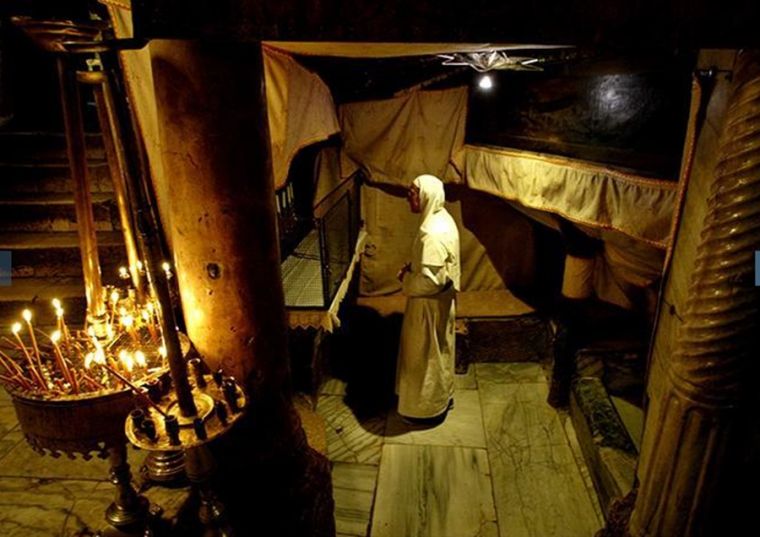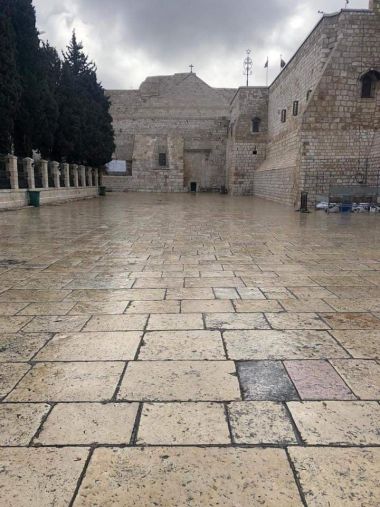Christmas has been 'very hard' for Christians in the Holy Land

It could be Christmas 2021 before the Holy Land starts to get back on its feet, Friends of the Holy Land has warned.
Christmas has been "very hard" for people in the region after Covid-19 wiped out the tourism and pilgrimage industry that it so heavily relies on.
What should have been one of the busiest times of the year for Bethlehem was reduced to only a few festivities watched on by a handful of locals.
"The sad thing about all this is the timing of the crisis. It erupted just before Easter, one of the biggest tourist seasons for the area," says Brendan Metcalfe, Executive Director of Friends of the Holy Land.
"So Easter 2020 didn't happen and now Christmas hasn't happened. If Easter doesn't happen again in 2021, then it may well be that we don't see tourists returning to Bethlehem until next Christmas, and that will be tragic."
The pandemic has left most people in the tourism and pilgrimage industry out of work, from tour guides and bus drivers, to hotel owners, restauranteurs, and souvenir shop owners. Then there are countless others in the supply chain, including the hundreds of local craftsmen who supply the souvenir shops that have been shuttered since the start of the pandemic.
Many people in the industry are Christians, and Friends of the Holy Land has been raising funds to support them throughout the year, including this Christmas through its Silent Nights in Bethlehem campaign which has so far raised over £100,000.
The money raised has gone on emergency grants to help local Christians buy medicine - which isn't free in this part of the world - food, gas for cooking and heating, or whatever other basic necessities they may be in need of.
This Christmas stands in stark contrast to how things looked at the end of 2019, says Brendan. This time last year, Bethlehem was coming to the end of a bumper year for tourism, with over three million tourists visiting throughout 2019.
That meant there was a lot of optimism, says Brendan. Not only were people looking forward to welcoming more tourists this year, they were also spending money, investing in improvements to their hotels or restaurants, or opening new ones.

"It's gone from that to absolutely zero now. Since the beginning of the pandemic in March, they've had nobody and so all those people have no income now. It's very difficult," he says.
In the UK, there have been schemes like furlough to support people financially through the pandemic. In the Palestinian Authority, there are no such schemes.
Resources are stretched and the healthcare system is weak, meaning they don't have the number of ventilators they need, and they have been unable to roll out mass testing.
For churches it's been tough too. Even the churches that were able to give some practical assistance at the start of the pandemic are struggling after nine months of lockdowns, restrictions and higher unemployment.
Brendan says the Friends of the Holy Land office in Bethlehem has been "inundated" during the pandemic with people seeking help to buy the basics.
The charity will continue to help them as best it can until the region starts to recover but any kind of long-term recovery is contingent on tourism starting up again - something Brendan fears is still at least 18 months away.
For one thing, it's possible the region will not permit major tourism again until everyone is vaccinated.
"How long is that going to take?" Brendan wonders.
Then there's a "big confidence issue".
"A lot of the people who traditionally go on pilgrimage to the Holy Land are older people," he explains.
"They are people who have got to that stage of their life where they can go on a longer vacation and do a once in a lifetime trip.
"With all the concerns around Covid, this is the very group of people who are going to be more nervous about travelling."
All of this just adds to the existing challenges of living in a region overshadowed by conflict and political tensions.
Mental health is "very difficult" and finding work elsewhere "is always a pressure", he says.
"A lot of the people singing 'O Little Town of Bethlehem' this Christmas won't realise what is actually happening in Bethlehem today and that it's so difficult.
"So people need help now but they're also going to need help continuing long into 2021."
But there are things that Christians in the UK and elsewhere can do to help. For one thing, they can pray.

"Many people feel a sense of despair because they've got no income and can't see any future for themselves. So prayer is very important in helping people deal with these pressures," says Brendan.
Then there's visiting the Holy Land. When things get better, his hope is that people will consider visiting the region.
"Make that trip you've always promised yourself; don't put it off," he says.
"As Christians, we read our Bibles all the time, but it's not a fairy story or a wonderland that doesn't exist. It exists.
"Around 90 per cent of what we read in our Bibles happened within a hundred mile radius of Jerusalem.
"If people have the confidence to visit once Covid is over, then that can help the region recover."
Brendan uses the word "obligation". He believes Christians have an obligation to visit the Holy Land at least once in their life, especially as the Christian population across the West Bank has declined over the decades to around only one per cent today.
"If we're not careful, I can see a time coming when the Church of the Nativity and all of the beautiful ancient churches across the Holy Land are just museums, with no actual worshipping congregation," he warns.
"Can you imagine the Church of the Holy Sepulchre, built in 326AD, with no congregation and only tourists walking around like they're in the British Museum?
"Muslims feel a duty to visit Mecca at least once in their life; Jews at Passover say 'next year in Jerusalem'. But I don't think as Christians we feel the same sense of obligation to visit the Holy Land.
"Yet if the people of the Holy Land hadn't taken on the Christian faith and shared it with the world, we wouldn't have the gift of faith today. How can we leave them to face this latest challenge alone?
"Everything we do at Friends of the Holy Land, whether it's helping with education or to repair homes or cover the cost of healthcare, it's all to encourage them to stay.
"Because at the moment there are more Palestinian Christians outside the West Bank and Gaza than there are inside, and that's not a good situation."











